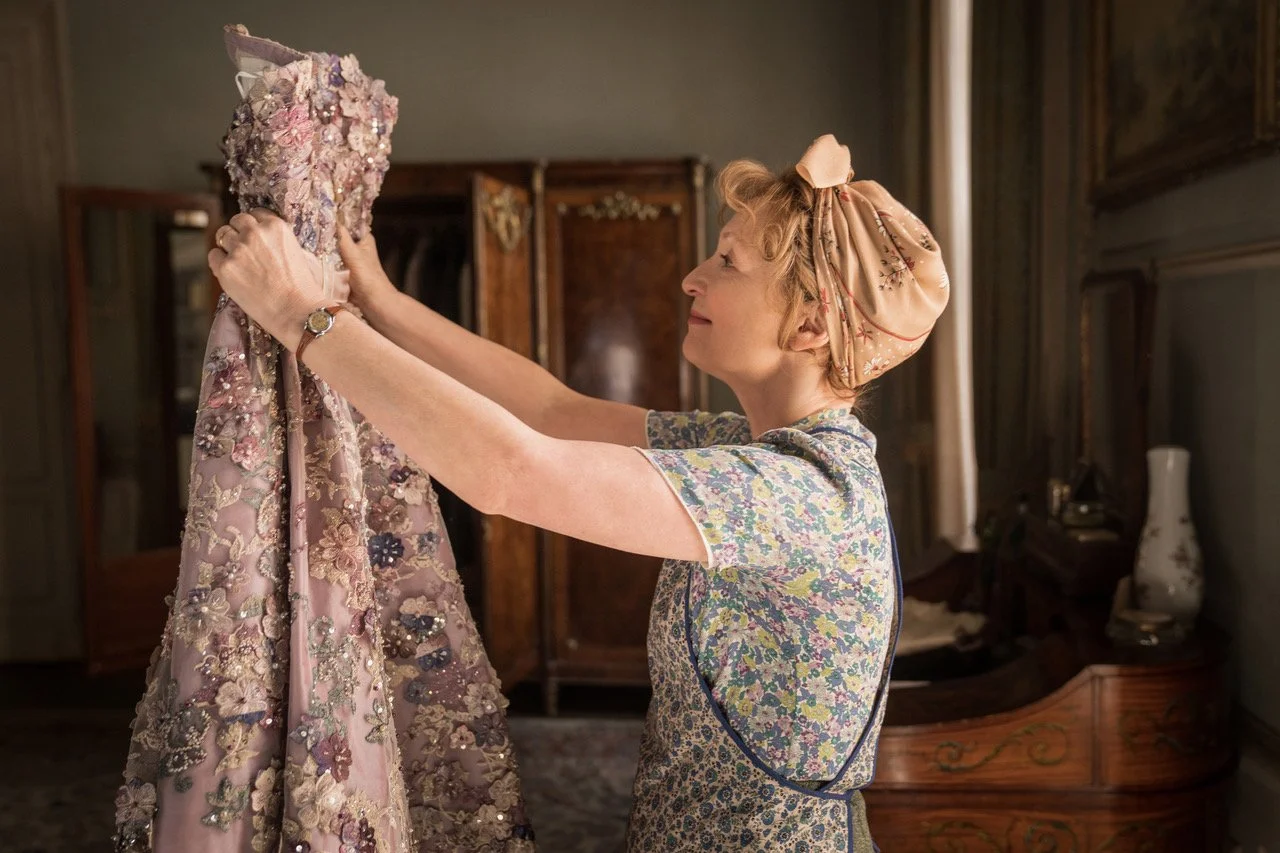Mrs. Harris Goes to Paris: Predictable, Light Fare as a Brit Maid Seeks Fashion Above Her Station
By Karen Gordon
Rating: B-
There may not be a lighter movie at the theatres this summer than Mrs. Harris Goes to Paris, which is a kind of fairy tale for adults, with some social issues mixed in.
It aims to be easy-going, entertaining and joyful, without being taxing or too stressful. At the same time, its reluctance to dig too deeply robs it of some of its emotion and makes it feel superficial.
The film is based on the first of a series of four novels written by Paul Gallico about the cheerful maid Mrs. Harris, first published in 1958 as Mrs. ‘Arris Goes to Paris.
Mrs. Harris and the object of her obsession.
Set in 1957, Mrs. Ada Harris (Lesley Manville) is a maid in London, working for well-heeled clients, who seem to admire her cheerful efficiency, but are not always fair to her.
Lady Dant (Anna Chancellor ) for instance, constantly talks about her own champagne tastes, and arranges the best for her high-end parties. But she cries poor when it comes to paying Mrs. H on time, or paying her well.
But it is at Lady Dant’s that Mrs. Harris first sees the garment that launches her quest: A beautiful, hand-made, embellished, couturier gown that Mrs. Dent confides she bought at the House of Dior in Paris, for 500 pounds.
The gown is colourful and sparkles against the sensible colours of daily life. It is a knock out. Mrs. Harris is smitten. Owning a thing of beauty at such a cost isn’t a practicality for her, but the dress has stirred a desire. Mrs. Harris decides she wants a Dior gown, and starts to take on more work. Her aim is to save up enough to fly to Paris, and buy the dress of her dreams directly from the House of Dior.
Her friends, Vi (Ellen Thomas), and the local bookie and ladies man Archie (Jason Isaacs) think she’s a bit mad, but they watch out for her and provide friendship and support. And she feels her late husband Eddie – whose death she’s still coming to terms with - might be watching over her and sending a little luck her way, making the impossible closer to reality,
Mrs. Harris arrives at the House of Dior to find more barriers to getting her dream fulfilled. Dior is having a showing of its latest collection to its posh customers, all of whom are dressed to the nines. Mrs. Harris is clearly not one of the wealthy, from her outfit to her accent, and she runs into her first major barrier in the form of Madame Colbert, played with snobbish glee, by Isabelle Huppert, who doesn’t want to allow this interloper in.
Mrs. Harris, with grit and determination, stands up for herself, and wins over a number of people within earshot, including Dior staffers, like the young accountant André (Lucas Bravo), model, the lovely Natasha (Alba Baptista) who is the face of Dior, and even a rich aristocrat Marquis de Chassagne (Lambert Wilson).
There are challenges for her all through the film, of course, that make her goal seem impossible at times. But is the dress really what she’s after? It’s impossible not to notice that the idea of buying something this indulgent represents a pinnacle of beauty, style and elegance that would normally be beyond reach. As an object of desire, it has meaning beyond the obvious one of such a dress hanging in the closet.
As you might expect in a film about the power of a beautiful dress, the movie is a mini- feast for fashion and design lovers. The production design, by Luciana Arrighi, and set decorator Nóra Talmaier is wonderful. (I particularly noted the bachelor pad with its mix of trad and mid century, and fabulous wallpaper).
Then there are the fashions. The House of Dior gave its stamp of approval to the film. Director Anthony Fabian hired one of the most honoured costume designers, the multi Oscar-winning Jenny Beavan (Cruella, A Room with a View). The clothes are beautiful.
At its core, Mrs Harris Goes to Paris is a fairy tale for grown-ups, a story about of a middle-aged widow, deciding to reach for something beautiful, and to renew and embrace life as full of beauty and possibilities.
Fabian, who also co-wrote the adaptation. seems to be aiming at a charming, enjoyable movie. Mrs. Harris is determined, but reserved. She has challenges, but is rarely daunted. There’s little room here for some of the harder moments to stick or gain emotional traction. As well, especially when’s he spends time in Paris, the film raises a variety of issues, including class discrimination and workers’ rights. But again, in the interests of being lighthearted, the movie skims the surface.
Am I overworking it here? Asking too much? Possibly. The movie wants to be a light entertainment, not a lecture, and yet it raises issues as a way of pushing the plot along. We can see it in Mrs. Harris’s determination to have something above her station, but also in the character of beautiful, young Dior model Natasha, who would rather be studying Sartre and philosophers, than making appearances on behalf of her employers.
All interesting ideas that, along with the idea of a maid buying a couture dress, suggest an era that is turning from rigid class-base, to something more modern. But the movie deals with everything in a perfunctory way.
Maybe I’m a curmudgeon. But the distance between the ideas that are raised in the wake of Mrs. Harris’s quest, and the easy way the film connects the characters and resolves much of the conflict is the movie’s major flaw.
Despite the barriers to Mrs. Harris’s quest, the pieces snap together too neatly and without much time for the characters to react. There are surprises and twists ahead, but by the third act, the predictability starts to wear down some of the film’s charm.
Helping it along though, is the cast. They supply what depth and nuance there is, and a level of believable, good natured friendship that is quite sweet and heartwarming. Lesley Manville is wonderful to watch, as always, as are Huppert, Isaac and Thomas.
(The casting of Lesley Manville is a fun twist for anyone who has seen Paul Thomas Anderson’s wonderful Phantom Thread. In that film, Lesley Manville played the manager of a British fashion house, dressed impeccably in beautiful black dress, with bright red lipstick and nail polish. It’s pretty much what her character, Mrs. Harris, comes face to face with at the House of Dior in Madame Colbert. It’s a delightful little grace note.)
But despite their efforts, the movie’s reticence to get its hands dirty makes it feel detached and distant. The lives of the characters tie up neatly, the story has a lot of charm. But there’s not a lot of emotional connection. We’ve grown fond of these characters, and can be happy for them. But it’s a bit of what we see rather than what we feel.
Eh bien.
Mrs. Harris Goes to Paris, directed by Anthony Fabian, Starring Lesley Manville, Isabelle Huppert, Jason Isaacs, Ellen Thompson. In theatres, Friday, July 15.




